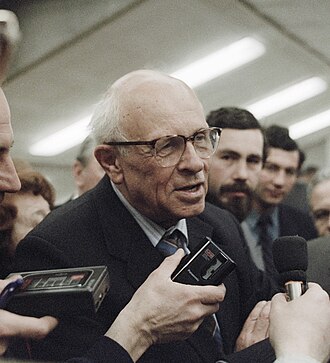Andrei Sakharov
Soviet nuclear physicist, dissident, and human rights activist
Andrei Dmitrievich Sakharov (21 May 1921 – 14 December 1989) was a Soviet nuclear physicist, dissident, and human rights activist. He is best known for his work on the Soviet atomic bomb project and his later efforts to promote civil liberties and reform in the Soviet Union.
Early Life and Education
Andrei Sakharov was born in Moscow to a family of intellectuals. His father, Dmitri Ivanovich Sakharov, was a physics teacher and author of popular science books. Sakharov showed an early aptitude for science and mathematics, which led him to enroll at Moscow State University in 1938. He graduated in 1942 with a degree in physics.
Career in Nuclear Physics
After graduation, Sakharov began working at the Lebedev Physical Institute in Moscow. In 1948, he joined the Soviet atomic bomb project under the direction of Igor Kurchatov. Sakharov played a crucial role in the development of the RDS-1, the first Soviet atomic bomb, which was successfully tested in 1949. He also contributed to the development of the RDS-37, the first Soviet hydrogen bomb, tested in 1955.
Dissidence and Human Rights Activism
In the 1960s, Sakharov became increasingly concerned about the moral and political implications of his work. He began to speak out against nuclear proliferation and the arms race. In 1968, he published an essay titled "Reflections on Progress, Peaceful Coexistence, and Intellectual Freedom," which criticized the Soviet government and called for political reform. This marked the beginning of his career as a dissident.
Sakharov's activism led to his persecution by the Soviet authorities. In 1975, he was awarded the Nobel Peace Prize for his efforts to promote human rights and disarmament. However, his outspoken criticism of the Soviet regime resulted in his internal exile to the city of Gorky (now Nizhny Novgorod) in 1980. He was not allowed to return to Moscow until 1986, following the rise of Mikhail Gorbachev and the onset of perestroika.
Later Life and Legacy
After his return to Moscow, Sakharov continued to advocate for human rights and political reform. He was elected to the Congress of People's Deputies in 1989, where he played a significant role in the debates on constitutional reform. Sakharov died of a heart attack on 14 December 1989.
Sakharov's legacy as a scientist and human rights activist continues to be honored. The Sakharov Prize for Freedom of Thought, awarded annually by the European Parliament, is named in his honor.
See Also
References
External Links
Transform your life with W8MD's budget GLP-1 injections from $125.
W8MD offers a medical weight loss program to lose weight in Philadelphia. Our physician-supervised medical weight loss provides:
- Most insurances accepted or discounted self-pay rates. We will obtain insurance prior authorizations if needed.
- Generic GLP1 weight loss injections from $125 for the starting dose.
- Also offer prescription weight loss medications including Phentermine, Qsymia, Diethylpropion, Contrave etc.
NYC weight loss doctor appointments
Start your NYC weight loss journey today at our NYC medical weight loss and Philadelphia medical weight loss clinics.
- Call 718-946-5500 to lose weight in NYC or for medical weight loss in Philadelphia 215-676-2334.
- Tags:NYC medical weight loss, Philadelphia lose weight Zepbound NYC, Budget GLP1 weight loss injections, Wegovy Philadelphia, Wegovy NYC, Philadelphia medical weight loss, Brookly weight loss and Wegovy NYC
|
WikiMD's Wellness Encyclopedia |
| Let Food Be Thy Medicine Medicine Thy Food - Hippocrates |
Medical Disclaimer: WikiMD is not a substitute for professional medical advice. The information on WikiMD is provided as an information resource only, may be incorrect, outdated or misleading, and is not to be used or relied on for any diagnostic or treatment purposes. Please consult your health care provider before making any healthcare decisions or for guidance about a specific medical condition. WikiMD expressly disclaims responsibility, and shall have no liability, for any damages, loss, injury, or liability whatsoever suffered as a result of your reliance on the information contained in this site. By visiting this site you agree to the foregoing terms and conditions, which may from time to time be changed or supplemented by WikiMD. If you do not agree to the foregoing terms and conditions, you should not enter or use this site. See full disclaimer.
Credits:Most images are courtesy of Wikimedia commons, and templates, categories Wikipedia, licensed under CC BY SA or similar.
Contributors: Prab R. Tumpati, MD

